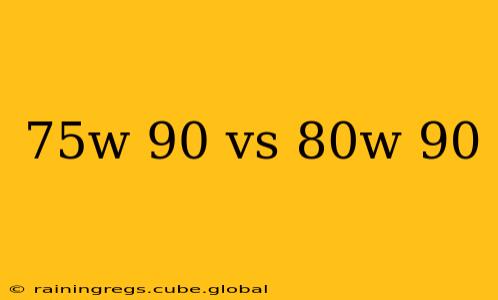Choosing the right gear oil for your vehicle is crucial for optimal performance and longevity of your transmission and differential. Two common weight grades often cause confusion: 75W-90 and 80W-90. While seemingly similar, understanding their differences can help you select the best lubricant for your specific needs. This article will clarify the distinctions between 75W-90 and 80W-90 gear oil, helping you make an informed decision.
What Do 75W-90 and 80W-90 Mean?
The numbers in the weight grade (e.g., 75W-90) represent the oil's viscosity, or thickness, at different temperatures. The "W" stands for "winter," indicating the oil's performance in cold temperatures. The first number (75 or 80) signifies the oil's viscosity at low temperatures – a lower number indicates thinner oil, better for cold starts and reduced wear in frigid conditions. The second number (90) represents the viscosity at high operating temperatures. Both 75W-90 and 80W-90 oils have the same high-temperature viscosity, meaning they offer similar protection under high heat.
What's the Difference in Viscosity Between 75W-90 and 80W-90?
The key difference lies in the low-temperature viscosity. 75W-90 gear oil is slightly thinner at low temperatures than 80W-90. This means that 75W-90 may offer:
- Easier cold starts: The thinner consistency allows for quicker lubrication of components when the gear oil is cold, reducing wear and tear.
- Improved fuel economy (potentially): Reduced friction from the thinner oil can lead to slightly better fuel efficiency, although this difference is often negligible.
Conversely, 80W-90 gear oil's thicker low-temperature viscosity may provide:
- Slightly better high-temperature protection: While both grades have the same high-temperature viscosity rating, the thicker 80W-90 might offer marginally better protection against extreme heat and load.
- Improved protection against leakage: Its higher viscosity can help reduce leakage in older or worn gearboxes.
Which Gear Oil Should I Choose: 75W-90 or 80W-90?
The best choice depends entirely on your vehicle's specifications and climate. Always consult your owner's manual; it will specify the recommended gear oil grade for your transmission and differential. Ignoring this recommendation could lead to damage.
Factors to Consider:
- Climate: If you live in an area with consistently cold winters, 75W-90 might be preferable for easier cold starts. If you experience extreme heat, 80W-90 might offer slightly better high-temperature protection.
- Vehicle Age and Condition: Older vehicles with worn seals might benefit from the thicker 80W-90 to minimize leaks. Newer vehicles are generally better suited to the thinner 75W-90.
- Vehicle Type and Usage: The type of vehicle and how it's used (e.g., towing heavy loads) will influence the optimal viscosity. Heavy-duty applications might benefit from the thicker 80W-90.
What is the best gear oil for my car?
This question cannot be answered definitively without knowing the make, model, and year of your vehicle. Your vehicle's owner's manual is the ultimate source of truth regarding the recommended gear oil.
Is 75W-90 gear oil suitable for all vehicles?
No. 75W-90 gear oil is suitable only for vehicles where it is explicitly specified in the owner's manual. Using the wrong gear oil can damage your transmission or differential.
Can I use 80W-90 gear oil instead of 75W-90?
Potentially, but only if your vehicle's specifications allow for it. Check your owner's manual. Using an incorrect grade of gear oil can void your warranty and potentially damage your vehicle.
By carefully considering your vehicle's requirements and climate, you can confidently choose between 75W-90 and 80W-90 gear oil to ensure optimal performance and protection. Remember to always consult your owner's manual for the manufacturer's recommendations.
